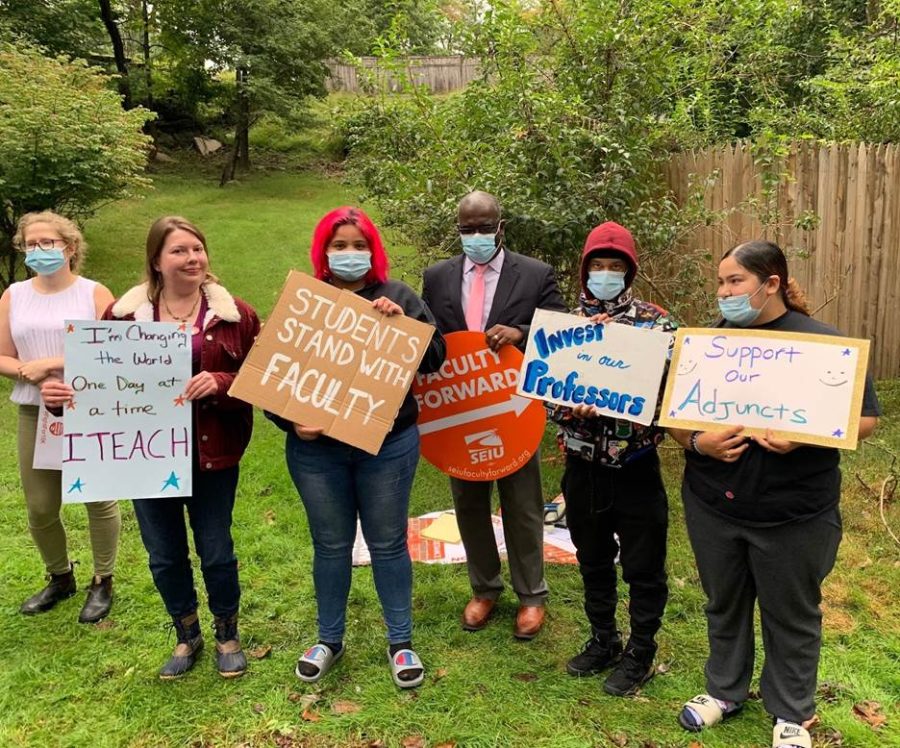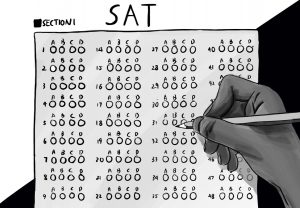A look into the lives of part-time professors
Service employees international union (SEIU)
Mercy college adjuncts and students gather to support the fight for better wages and security benefits.
May 27, 2022
Mercy College adjunct faculty were prepared to strike on May 2 due to the low pay and minimal benefits that were being offered. Adjuncts are part time professors who make up a large portion of the Mercy College community; many of those faculty members felt as if they weren’t receiving the proper income to live sustainably. In the past, there had been bargaining sessions between the union committee and the administration to come to a fair deal, but they all ended in disagreement.
Many adjuncts did not want to cause a work stoppage because of how it would affect the students, but they felt they had no other choice. Fortunately, during a bargaining session on April 28, 2022, there was a contractual agreement reached. The new agreement consisted of a payment increase, greater bonuses, more stability, as well as tuition remission to help alleviate the cost for families.
Although adjuncts teach part-time, they typically balance more than one job in order to provide for themselves and their families. Elisabeth Merrill used to be an adjunct science teacher at Mercy college for several years before leaving in 2016; she is also a faculty member of the Masters community but is currently on sabbatical. Merill had little interaction with other teachers because she taught night classes such as Biology, Anatomy, and Physiology.
Merill was juggling other jobs at that point as well as having four kids. “It was not financially prudent to take that job because the pay was very low. It was around $2500 for a semester, which is fifteen weeks, but for a class of 24 to 30 kids, it’s not much money,” she said.
She also went on to talk about the effects that the low income had on the students’ ability to learn because of what the adjuncts can offer equitably. “I believe what made me different as a teacher was that I taught like I would teach in high school. I gave weekly quizzes, and also allowed for test corrections, but for other adjuncts since the pay is so bad, they did three tests per semester,” Merill said.
Since there are so few tests per semester, it puts a lot of added pressure on students to perform better academically. Our working conditions are our students’ learning conditions, and improving those conditions for adjuncts will lead to better student success — Katherine Flaherty
Katherine Flaherty has been an adjunct faculty member at Mercy College since 2015 and teaches critical thinking and junior seminars, as well as previously teaching in the English department. She maintained that the biggest issues are job security, wages, and benefits; the lack of these is what pushed the adjuncts to potentially strike.
“If you’re teaching there for one semester or more, there’s no guarantee of longer employment. Due to this we have been proposing two year long contracts, renewable based on job performance and security. It’s not too much to ask because it’s so hard to plan your life when you don’t know if you will be teaching the next semester along with working other jobs,” Flaherty said.
It is difficult for adjuncts to be able to give students the proper time and energy because of what they have to balance. Flaherty is currently working three jobs, and at her most she was working six jobs several years ago to receive more income. “Our working conditions are our students’ learning conditions, and improving those conditions for adjuncts will lead to better student success,” Flaherty said.
When taking success into consideration, some students might care about the portion of adjuncts that make up a college community. Since adjuncts are only part-time, this could affect students’ abilities to be able to be in touch with their teacher when needed. Communication issues are not a question of the adjuncts’ dedication to their students but rather their commitment to other jobs.
Esperanza Borrero has been a college counselor at Masters for 5 years, and firmly believes that it is a students personal decision to decide whether or not having adjunct faculty is an issue. “I don’t place a value for a student to make; that’s an individual decision. For some it may be a factor, but I think it’s important that they know before going to that college,” she said. Borrero maintains that the learning experience will be different when students are being taught by adjuncts because of communication barriers, such as limited office hours, but they can still have a successful educational experience.



























